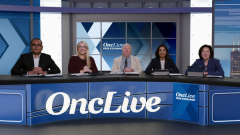
Is There a Role for CDK4/6 Inhibition in HR+/HER2+ Breast Cancer?
Shifting their focus to the HR+/HER2+ setting of breast cancer, expert panelists consider the potential of CDK4/6 inhibition in light of clinical trial data.
Episodes in this series

Transcript:
Hope S. Rugo, MD, FASCO: The idea of the ERBB2, as you pointed out, which I think most people are going to know as HER2 mutations, although the terminology as you put it is correct—there’s a lot of interest in those, and there was also an interesting discussion about responses to different agents based on defects and DNA repair genes, etc. But a tumor that’s truly HER2-positive, there’s a lot of interest in CDK4/6 [cyclin-dependent kinase 4/6] inhibitors there too, right?
Komal Jhaveri, MD, FACP: Yes.
Hope S. Rugo, MD, FASCO: Mark, do you want to comment on that?
Mark Pegram, MD: That hypothesis is going to really be put to the test with a large, randomized phase 3 trial called PATINA (NCT02947685), which will take patients who are treated with CLEOPATRA (NCT00567190)-like regimens, with first-line ER-positive HER2-positive metastatic disease. After they finish the taxane sequence of the pertuzumab/trastuzumab plus taxane combination, in that maintenance phase when we typically will layer in an anti-estrogen along with continuation of the dual antibodies, patients in that setting are being randomized to get palbociclib or not. That trial has completed accrual, so we’re just waiting for the events. That’s going to be very exciting to be the first randomized phase 3 trial to test that hypothesis. The science looks very sound. The data from Dana-Farber [Cancer Institute in Boston, Massachusetts] published in Cancer Cell years ago appear to be very robust. It wasn’t restricted to just one type of HER2-targeting agent. It included both small-molecule kinase inhibitors as well as antibodies; both showed similar synergistic effects when combined with CDK4/6 inhibitors. I think it’s going to be really exciting, and PATINA will answer the question once and for all, hopefully.
Hope S. Rugo, MD, FASCO: Yes, I think it’s an interesting question. One question came up about the HARMONIA trial (NCT05207709), and I don’t know if you’ve heard of that trial. But there were some data from Aleix Prat looking at the MONALEESA trials and showing that ribociclib seemed to be very active in the hormone receptor-positive HER2-enriched subset. There was the idea that you would take tumors that might be more responsive to ribociclib and randomize patients to get ribo[ciclib] or palbo[ciclib]. You wonder after this meeting, ASCO [American Society of Clinical Oncology] ’22, will people randomize into a trial like HARMONIA?
Anne O’Dea, MD: It’s a difficult conversation to have with patients and try to explain all the data, the nuances in the data, and try to have them understand even that additional randomization. That’s going to be a very difficult trial to accrue to. But certainly, a valid question.
Hope S. Rugo, MD, FASCO: I don’t know if you have any thoughts about that HER2-enriched data.
Aditya Bardia, MD, MPH: From a scientific perspective, as Mark likes to differentiate between scientific and clinical perspective, it’s great because the MONALEESA CD showed that the HER2-enriched group is a group where ribociclib has activity, and palbociclib from other data set did not have activity in the HER2-enriched. This is the first trial that is looking head to head, one CDK4/6 inhibitor vs another, which we’ve not done before. This would provide a lot of data, not just biomarkers but also comparative efficacy of these agents. From a clinical perspective, it will be challenging, especially because we don’t have overall survival data. There’s concern that HER2 enriched might not benefit from palbociclib, so might be tough to enroll.
Hope S. Rugo, MD, FASCO: I think that’s interesting, the whole idea that there might be subsets within hormone receptor positive disease. W that we already know they respond to different treatments, right? The patients who have the ERBB2 or HER2 somatic mutations, acquired mutations, don’t seem to have as great a response to endocrine therapy overall. These are not HER2-positive tumors; they’re HER2-enriched by intrinsic subtyping, like you get with blueprint or something like that. From the beginning, it might be hard to really compare CDK4/6 inhibitors in that setting. I think that the other question about the PATINA trial is whether, if we move ADCs into the first-line setting, how is that going to affect our maintenance? How are we going to do that? That’s going to be a big challenge. If you give an antibody drug conjugate, you don’t want to give it forever because they have more toxicity. How would you manage the maintenance? I don’t think we know. Komal?
Komal Jhaveri, MD, FACP:, I think [those are] excellent points. When we got the CDK4/6 inhibitors into clinical trials, I think the only preclinical data that came out of the labs of Dennis Layman and Richard Finn, M.D., and from cell lines did suggest that the maximum sensitivity that we saw was in the luminal cell lines. But we also saw 10 out of 16 HER2-enriched cell lines that did respond and have sensitivity to palbociclib. It would be nice to have at least—granted, in a small subset—a good head-to-head comparison for the 2 CDK4/6 inhibitors up front, because we keep debating about what are the differences between these two agents. One good way would be to know, head-to-head, are there any differences?
Hope S. Rugo, MD, FASCO: Who thinks that’s going to happen?
Mark Pegram, MD: Maybe when they become generic.
Hope S. Rugo, MD, FASCO: Even so, I think it may be hard. Some of the ability to do the trials is enhanced, unfortunately, by lack of availability in many countries. When you do these trials, even HARMONIA, if the drugs are provided it makes a really big difference. I worked a lot on the biosimilar trials. It’s a great thing to be able to provide incredibly effective drugs to people by having clinical trials, so this is good.
Transcript edited for clarity.










































